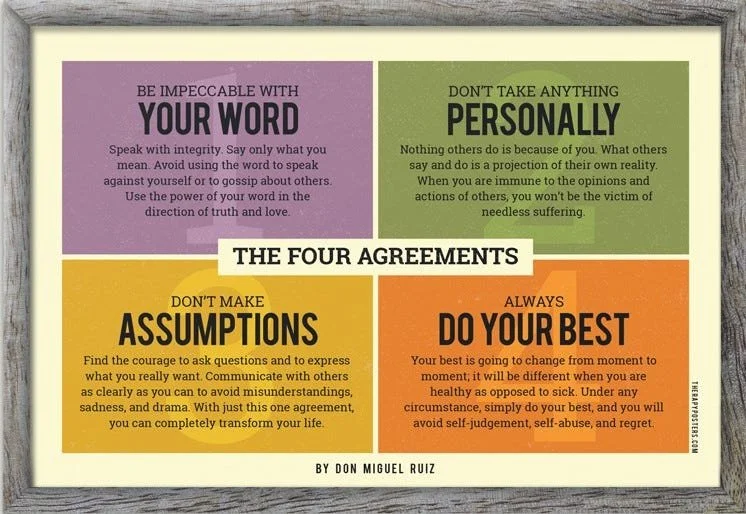Summary: "The Four Agreements" offers transformative insights for enriching partnerships, fostering deeper understanding and mutual respect. Key ideas: Honest Speech, Personal Detachment, Assumption Avoidance, Optimal Effort. These principles can guide partners towards a more harmonious and fulfilling relationship.
I often get asked what to do in a partnership that has misunderstandings and mismatched expectations. I often refer partners to Don Miguel Ruiz's "The Four Agreements." Its simple yet profound wisdom, can introduce important principles into any partnership dynamics.
The Four Agreements can be a touchstone when working any partnership. While the book is primarily written as a guide for personal freedom, its principles can be applied to enhance partnerships.
1. Be Impeccable with Your Word
In any partnership, trust is the glue. Being impeccable with your word means that you speak with integrity, avoid gossip and ensure that you say only what you mean. When promises are kept and expectations are set clearly, misunderstandings reduce significantly. Committing to honest communication fosters a climate of trust and respect. This way you partner will know that they can rely on you, and vice versa. This is the first step towards a fruitful collaboration.
Tip for Implementation: Schedule regular check-ins with your partner. Use these opportunities to openly communicate about progress, challenges, and expectations. Be transparent and proactive in your communication lays the foundation for trust.
2. Don't Take Anything Personally
Misunderstandings and conflicts can be inevitable in any partnership. When feedback is provided or disagreements arise, it's essential to remember that these aren't necessarily personal attacks. By not taking things personally, you allow yourself to view feedback objectively and use it as a tool for growth and improvement.
Tip for Implementation: When faced with criticism, take a moment to reflect before responding. Is there a grain of truth in the feedback? How can you use it constructively? Approach disagreements with curiosity rather than defensiveness.
3. Don't Make Assumptions
Many partnership conflicts arise from unspoken assumptions. We might assume our partner knows what we expect, or we might misinterpret their actions based on our own biases. To avoid this, seek clarity, ask questions to ensure everyone is on the same page. Avoid making assumptions helps reduce the chances of misunderstandings and misalignments.
Tip for Implementation: Make it a practice to repeat and summarize important points during discussions. Encourage an environment where questions are welcomed, and ensure that both parties are aligned on objectives and responsibilities.
4. Always Do Your Best
Doing your best doesn't mean striving for perfection - that's impossible. It means giving your all within the context of your current circumstances. In partnerships, this commitment ensures that both parties are putting in their maximum effort to achieve the shared goal. Knowing that each side is giving their best fosters mutual respect and drives the partnership towards success.
Tip for Implementation: Celebrate the small wins together. Recognize the efforts of your partner and regularly assess and redefine what "doing your best" looks like in the context of changing circumstances.
"The Four Agreements" can be powerful tools to enhance the quality of partnerships. By fostering a culture of trust, open communication, mutual respect, and commitment, partners can not only achieve their objectives but also enjoy the journey of collaboration. When both parties commit to these agreements, the partnership becomes a powerhouse, driving towards unparalleled success.


